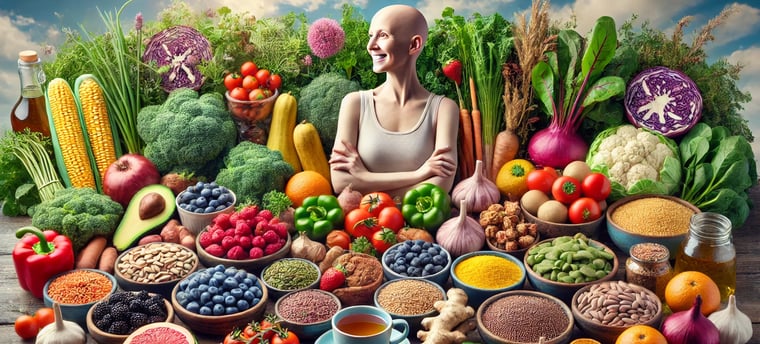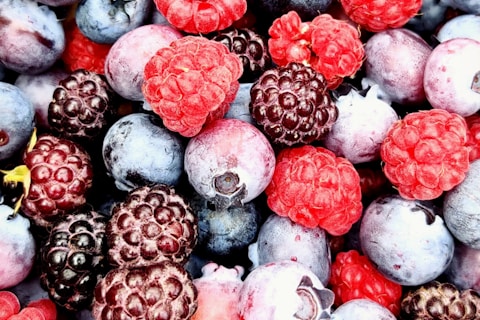Powerful Foods That Prevent Cancer: A Comprehensive List
Discover the top foods that prevent cancer and learn how to incorporate them into your diet. Boost your health with antioxidant-rich, cancer-fighting foods and take a proactive step toward cancer prevention.
NUTRITION
Georgen Thye
6/23/20245 min read


Cancer is a leading cause of death worldwide, but the good news is that your diet can play a significant role in reducing your risk. Certain foods contain powerful compounds that can help prevent cancer and improve overall health. In this blog post, we'll explore the top foods that prevent cancer and how you can incorporate them into your daily diet to boost your health and reduce your cancer risk.
The Role of Diet in Cancer Prevention
Your diet is one of the most critical factors in cancer prevention. Foods rich in antioxidants, vitamins, minerals, and fiber can protect your cells from damage, reduce inflammation, and boost your immune system. By choosing a diet rich in cancer-fighting foods, you can take a proactive step toward preventing this disease.


Top Foods That Prevent Cancer
Cruciferous Vegetables
Examples: Broccoli, cauliflower, cabbage, Brussels sprouts, kale
Benefits: These vegetables are high in glucosinolates, which are sulfur-containing compounds. When eaten, glucosinolates are broken down into active compounds like indoles and isothiocyanates that have been shown to inhibit cancer cell growth.


Berries
Examples: Blueberries, strawberries, raspberries, blackberries
Benefits: Berries are packed with vitamins, minerals, and antioxidants like vitamin C and anthocyanins. These compounds can help reduce inflammation and protect cells from oxidative damage, which can lead to cancer.


Tomatoes
Benefits: Tomatoes are rich in lycopene, a powerful antioxidant that has been linked to a reduced risk of several types of cancer, particularly prostate cancer. Cooking tomatoes increases the bioavailability of lycopene, making it easier for your body to absorb.


Garlic
Benefits: Garlic contains sulfur compounds that have been shown to stop cancer cells from forming and multiplying. These compounds can also boost the immune system's ability to fight cancer.


Green Tea
Benefits: Green tea is rich in polyphenols, particularly catechins, which are antioxidants that may help prevent cancer by reducing the formation of free radicals in the body.


Raja Ulam
Benefits: Raja Ulam, a traditional Malaysian herb, is rich in antioxidants, vitamins, and minerals. It has been shown to have anti-cancer properties due to its high content of flavonoids and other bioactive compounds.


Leafy Greens
Examples: Spinach, kale, Swiss chard, collard greens
Benefits: Leafy greens are high in fiber, vitamins, minerals, and antioxidants. They contain carotenoids, which are plant pigments that act as antioxidants and can help prevent cancer.


Nuts and Seeds
Examples: Walnuts, flaxseeds, chia seeds, almonds
Benefits: Nuts and seeds are rich in healthy fats, fiber, and antioxidants. Flaxseeds and chia seeds contain lignans, which are plant compounds that have been shown to reduce the risk of breast cancer.


Whole Grains
Examples: Brown rice, quinoa, oats, barley
Benefits: Whole grains are high in fiber, which can help lower the risk of colorectal cancer. They also contain vitamins, minerals, and antioxidants that can contribute to cancer prevention.


Turmeric
Benefits: Turmeric contains curcumin, a powerful anti-inflammatory and antioxidant compound. Curcumin has been shown to inhibit the growth of cancer cells and reduce the spread of tumors.


Legumes
Examples: Beans, lentils, chickpeas
Benefits: Legumes are high in fiber, protein, and antioxidants. They can help regulate blood sugar levels, reduce inflammation, and lower the risk of certain cancers, including colorectal cancer.


How to Incorporate Cancer-Preventing Foods into Your Diet
Snack on Nuts and Seeds: Keep a small container of mixed nuts and seeds with you for a healthy and cancer-fighting snack.
Drink Green Tea: Replace your regular tea or coffee with green tea to take advantage of its antioxidant properties.
Add Garlic to Your Meals: Incorporate garlic into your cooking, whether it’s in sauces, soups, or stir-fries.
Enjoy Leafy Greens and Cruciferous Vegetables: Make salads with a variety of leafy greens, and include cruciferous vegetables in your meals by steaming, roasting, or adding them to soups and stews.
Use Turmeric in Cooking: Add turmeric to curries, soups, and even smoothies to benefit from its cancer-preventing properties.
Opt for Whole Grains: Choose whole grain options like brown rice, quinoa, and whole wheat bread over refined grains.
Incorporate Herbs and Spices: Use a variety of herbs and spices, such as Raja Ulam, ginger, and basil, in salads, as garnishes, in smoothies, or in traditional dishes to enhance flavor and boost your intake of cancer-fighting nutrients.
Conclusion
Incorporating foods that prevent cancer into your diet is a powerful way to take control of your health. By choosing nutrient-rich, antioxidant-packed foods, you can reduce your cancer risk and improve your overall well-being. Remember, a balanced diet combined with a healthy lifestyle is the best approach to cancer prevention. Start making small changes today, and enjoy the long-term benefits of a healthier, cancer-fighting diet.
References
American Institute for Cancer Research. (2018). The AICR’s Foods that Fight Cancer™. Retrieved from AICR
National Cancer Institute. (2020). Cruciferous Vegetables and Cancer Prevention. Retrieved from NCI
Harvard T.H. Chan School of Public Health. (n.d.). The Nutrition Source: Vegetables and Fruits. Retrieved from Harvard Nutrition Source
American Cancer Society. (2019). Dietary Recommendations for Cancer Prevention. Retrieved from ACS
Willett, W. C., & Trichopoulou, A. (2014). Nutrition and cancer: A review of the evidence. Public Health Nutrition, 17(1), 11-14. DOI: 10.1017/S1368980013003708




